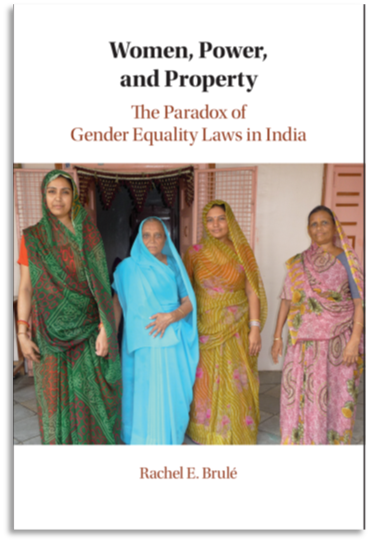
Women, Power and Property: The Paradox of Gender Inequality Laws in India
Cambridge University Press, Cambridge Studies in Gender & Politics Series, 2020
Winner of the Gregory Luebbert Prize for Best Book in Comparative Politics, American Political Science Association, 2021
Quotas for women in government have swept the globe. Yet we know little about their capacity to upend entrenched social, political, and economic hierarchies. Women, Power, and Property explores this question within the context of India, the world’s largest democracy.
Brulé employs a research design that maximizes causal inference alongside extensive field research to explain the relationship between political representation, backlash, and economic empowerment. Her findings show that women in government – gatekeepers – catalyze access to fundamental economic rights to property. Women in politics have the power to support constituent rights at critical junctures, such as marriage negotiations, when they can strike integrative solutions to intrahousehold bargaining. Yet there is a paradox: quotas are essential for the enforcement of rights, but they generate backlash against women who gain rights without bargaining leverage.
In this groundbreaking study, Brulé shows that well-designed quotas can operate as a crucial tool to foster equality and benefit the women they are meant to empower.
“Rachel Brulé’s Women, Power and Property: The Paradox of Gender Equality Laws in India (Cambridge University Press), is a marvel of data collection, history and insight into the relationship between gender and the state.”
Pratap Bhanu Mehta, “Best Book of 2020”, Open Magazine
“In this powerful and subtle book, Rachel Brulé combs through an array of micro-level data for clues regarding the causes of and obstacles to gender inequality in India. One of her most stunning findings is that femicide actually increases when gender-equal inheritance laws are enforced – unless families are freed from the expectation that a daughter’s property is forfeited to in-laws upon marriage. This book is a triumph of social science and a model for empirical scholarship on gender.”
Frances McCall Rosenbluth, Yale University
“Brulé’s study breaks new ground in exploring the economic effects of women’s political representation. Her ‘gatekeeper’ theory shows how the presence of female officials in local governments in India shapes whether women are able to access their rights and improve their economic status. The result is a clear illustration that meaningful change for women requires shifts in social norms and practices – not just in formal legal reforms.”
Melani Cammet, Harvard University
“The study of property rights is undergoing a resurgence in political science. Rachel Brulé’s stunning new book is at the forefront of this movement. Expertly combining the best tools of area studies and modern social science, Brulé shows how increases in women’s political representation have altered social and property relations in India. Anyone interested in how low-status groups can challenge a deeply entrenched status quo should read this book.”
Timothy M. Frye, Columbia University